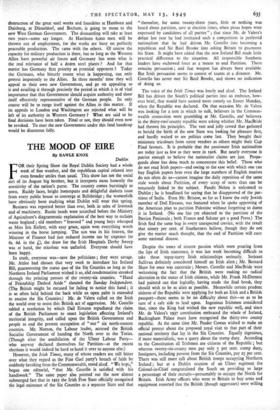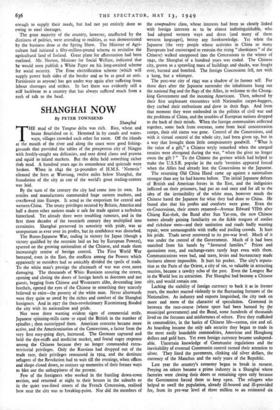THE MOOD OF EIRE
By RAVVLE KNOX Dublin
FOR their Spring Show the Royal Dublin Society had a whole week of fine weather, and the republican capital relaxed into even broader smiles than usual. This show has not the social airs of its August big brother, but it interprets more honestly the sensitivity of the nation's purse. The country comes burstingly to town. Ruddy faces, bright homespuns and delightful dialects issue from every public house to converge at Ballsbridge ; the womenfolk have obviously been studying what Dublin will wear this spring.
Business was reported better than ever, both in sales of livestock and of machinery. Rustic heads were scratched before the Ministry of Agriculture's diagrammatic explanation of the best way to reclaim waste bogland ; old members "bravoed" and young boys whooped as Miss Iris Kellett, with easy grace, again won everything worth winning in the horse jumping. The sun was in his heaven, the Minister of Finance had just reduced income tax by sixpence (to 6s. 6d. in the £), the draw for the Irish Hospitals Derby Sweep was at hand, the tricolour was unfurled. Everyone should have been happy.
In truth, everyone was—save the politicians ; they were savage. Mr. Attlee had chosen that very week to introduce his Ireland Bill, guaranteeing the status quo of the Six Counties so long as the Northern Ireland Parliament wished it so, atid condemnation streaked through the printing presses of the twenty-six counties. "Hand of Friendship Dashed Aside" shouted the Sunday Independent. (The British might be excused for failing to notice this hand ; it is so often held behind the back while an open palm is extended to receive the Six Counties.) Mr. de Valera called on the Irish the world over to resist this British act of aggression. Mr. Costello tabled a resolution by which Dail Eireann repudiated the claim of the British Parliament to enact legislation affecting Ireland's territorial integrity, and called upon the British Government and people to end the present occupation of "our" six north-eastern counties. Mr. Norton, the Labour leader, accused the British Socialist Government of handing the North over to the Tories. (Though after the annihilation of the Ulster Labour Party— who anyway declared themselves for Partition—at the recent elections it would indeed be hard to hand it over to anyone else.) However, the Irish Times, many of whose readers are still bitter over what they regard as the Fine Gad party's breach of faith by suddenly breaking from the Commonwealth, stood aloof. "We hop;" began one editorial, "that Mr. Costello is satisfied with his handiwork." The same paper also pointed out the now almost submerged fact that in 1925 the Irish Free State officially recognised the legal existence of the Six Counties as a separate State and that
"thereafter, for some twenty-three years, little or nothing was heard about partition, save at election times, when pious hopes were expressed by candidates of all parties " ; that since Mr. de Valera's defeat last year he had instituted such a competition in perfervid nationalism that he had driven Mr. Costello into becoming a republican and Sir Basil Brooke into asking Britain to guarantee his State. It might have added that the new Ireland Bill made little practical difference to the situation. All responsible Southern leaders have eschewed force as a means to end Partition. There remains persuasion ; and that weapon has always been available. But Irish persuasion seems to consist of taunts at a distance. Mr. Costello has never met Sir Basil Brooke, and shows no indication of doing so.
The voice of the Irish Times was lonely and aloof. The Ireland Bill has driven the South's political parties into an embrace, how- ever brief, that would have seemed more comely on Easter Monday, when the Republic was declared. On that occasion Mr. de Valera was looking for a tent in which to sulk, believers in the Common- wealth connection were grumbling at Mr. Costello, and believers in the thirty-twecounty republic were asking whither Mr. MacBride had thrown his principles. The vast and jolly crowd that gathered to herald the birth of the new State was looking for pleasure first, and hardly waited to see politics come last. They bought their miniature tricolours from street vendors as others might their Cup Final favours. It is probable that the passionate Irish nationalists are today just as few as they were in 1916. But nearly everyone is patriot enough to believe the nationalist claims are just. Propa- ganda alone has done much to concentrate this belief. Those who do not read Irish papers—and owing to the ease with which one can buy English papers here even the large numbers of English tourists do not often do so—cannot imagine the daily repetition of the same stale words about Partition, of every scrap of news than can be tenuously linked to the subject. Pandit Nehru is welcomed to Dublin ; he is headlined for saying that he disapproved of the par- tition of India. Even Mr. Briscoe, so far as I know the only Jewish member of Dail Eireann, was featured when he spoke approving of the American plan to partition Palestine without forgetting to damn it in Ireland. (No one has yet objected to the partition of the Iberian Peninsula ; both Franco and Salazar get a good Press.) The Irish find the same bug in every unexpected crevice, with the result that ninety per cent. of Southerners believe, though they do not give the matter much thought, that the end of Partition will cure some national disease.
Despite the tones of sincere passion which were pouring from the lips of Irish statesmen, it was last week becoming difficult to take these topsy-turvy Irish relationships seriously. Serjeant Sullivan definitely considered himself an Irish alien ; Mr. Bernard Shaw for once was uncertain ; Messrs. Costello and MacBride were welcoming the fact that the British were making no radical alteration in the status of Irish citizens, while Mr. Frank McDermot had pointed out that logically, having made the final break, they should wish to be as alien as possible. Meanwhile certain prudent citizens of the Republic were applying for both an Irish and a British passport—there seems to be no difficulty about this—so as to be sure of a safe side to land upon. Ingenious Irishmen considered that, since the King had wished the new republic well, and since Mr. de Valera's 1937 constitution embraced the whole of Ireland, Buckingham Palace must have recognised the thirty-two county republic. At the same time Mr. Peader Cowan wished to make an official protest about the proposed royal visit to that part of their national territory that lay in the Six Counties. Equally ingenious, if more materialistic, was a query about the stamp duty. According to the Constitution all Irishmen are citizens of the Republic ; but whereas twenty-six-county men pay only 5 per cent, stamp duty, foreigners, including persons from the Six Counties, pay 25 per cent. There was still more talk about British troops occupying Northern Ireland ; but at a Dublin reunion of an Ulster regiment the Colonel-in-Chief congratulated the South on providing so large a percentage of their recruits—presumably to occupy the North for Britain. Irish Army officers who went to Britain to buy arms and equipment reported that the British (though aggressors) were willing enough to supply their needs, but had not yet entirely done so owing to steel shortages.
The great majority of the country, however, unaffected by the dizziness of politics, were attending to realities, as was demonstrated by the business done at the Spring Show. The Minister of Agri- culture had initiated a fifty-million-pound scheme to revitalise the agricultural land of Ireland. Great plans for afforestation had been outlined. Mr. Norton, Minister for Social Welfare, indicated that he would soon publish a White Paper on his long-awaited scheme for social security. The Erne electrification scheme (which will supply power both sides of the border and so be as good an anti- Partitionist as anyone) has got under way again after suffering from labour shortages and strikes. In fact there was evidently still a stiff backbone to a country that has always suffered much from a rush of talk to the head.







































 Previous page
Previous page